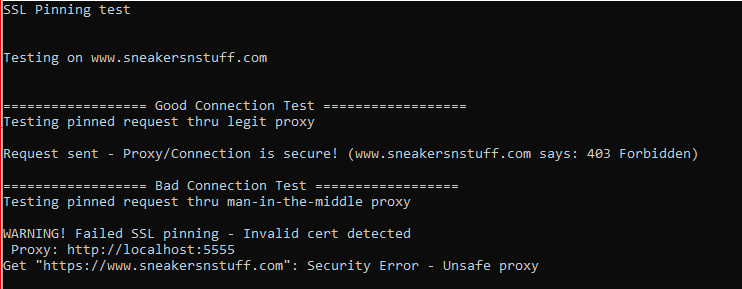SecureClient
Automatic SSL Pinning
Secure the standard net/http client with SSL pinning to prevent users from sniffing requests with a Man-In-The-Middle proxy
This package takes in a list of hosts and provides a function to create net/http clients with SSL Pinning.
For best practices
pinner, err := SecureClient.New(hosts, requireAll, BadPinDetected)
Should be called on startup (typically in main()), and whenever a client is needed you may call
client, err := pinner.NewClient(proxy)
The SSL Pins only need to be generated once per program run max, which is done in SecureClient.New().
Future plans include storing SSL Pins to file and updating them once a week or so. I'm pretty sure the pins shouldnt change for a good bit of time.
Example Usage
Example 1 - See tests
Here is the output from example 1 on SNS.

The first test was done without any MITM sniffer and succeeded (unproxied, a valid connection).
The second test was done using Postman Request interceptor (the standard proxy on localhost:5555)
Example 2
package main
import (
"fmt"
"github.com/rustler47/SecureClient"
)
func main() {
fmt.Println("SSL Pinning test\n\n")
MITMProxy := "http://localhost:5555"
hosts := []string{ "kith.com" }
BadPinDetected := func(proxy string){
fmt.Println("WARNING! Failed SSL pinning - Invalid cert detected\n", "Proxy:", proxy)
}
pinner, err := SecureClient.New(hosts, true, BadPinDetected)
if err != nil { return }
client, err := pinner.NewClient(MITMProxy)
if err != nil { return }
client.Get("https://kith.com")
pause := make(chan bool, 1)
<-pause
}
Tips
BadPinDetected fires when the SSL pin is not matched, and passes in the proxy which triggered the bad connection. This is a perfect place to send a message to an API to flag the user and/or disable their key
References
tam7t/hpkp
 Documentation
¶
Documentation
¶
